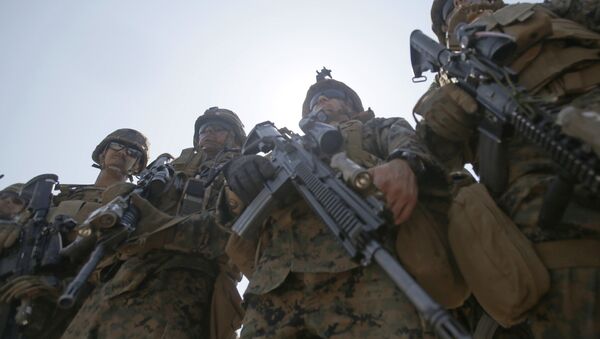Addressing the issue where the US Marines are likely to fight in the future, the service's commandant, Gen. Robert Neller, said that "the focus is more on the Pacific and Russia," while speaking to a 300-member Marine unit in Norway.
Konstantin Sivkov, Russian military analyst and president of the Academy for Geopolitical Problems, believes that the US Marine Corps poses a challenge to Russia's security.
"In the event of aggression the US Marines would be primarily deployed in the north to capture submarine bases in the Murmansk region [of Russia] as their [strategic] goal," Sivkov told Sputnik. "In the south, they may land in the Crimea, in the Far East — most likely Kamchatka — where strategic submarines are also based."
On December 21, Military.com reported that Gen. Robert Neller visited the Norwegian Home Guard base near Trondheim that is home to the US Marine rotational force.
"I hope I'm wrong, but there's a war coming…. You're in a fight here, an informational fight, a political fight, by your presence," the commandant of the United States Marine Corps said, as quoted by the media outlet.
Commenting on Neller's words, Lt. Col. Eric Dent, a spokesman for the general, told The Washington Post that the commandant's words "were intended to inspire and focus the Marines' training," adding that the US servicemen were also informed that Russia, China, Iran and North Korea are not willing to go to war with the US.
"Being ready is a constant practice and refocusing. Neller and others have said, 'If you want peace, train for war.' That's exactly what we want and are doing," Lt. Col. Dent said, as quoted by the media outlet.
However, the Russian Armed Forces are well prepared for this scenario, Sivkov noted, adding that the Russian military personnel are honing the skill of anti-landing operations.
According to the military analyst, one of the main challenges to the assault forces is Russia's coastal missile and artillery systems, like the 3K60 Bal, designated by NATO as the SSC-6 "Sennight," which is capable of striking targets at a distance of 120 kilometers (74.5 miles). The 3K60 Bal can secretly detect targets, launching a total of 32 missiles with a maximum interval of up to three seconds.
The A-222 Bereg ("Coast"), a Russian 130 mm self-propelled coastal artillery gun, could become yet another unpleasant surprise for the adversary, the analyst noted. It is capable of destroying surface targets, including high-speed targets, at a distance of up to 22 kilometers. The Bereg artillery system can drown enemy ships almost autonomously.
Given this, a landing operation would be no walk in the park for the US Marines, even if they were to escape Russian naval forces, Sivkov stressed.

Although the US Marine contingent in Norway, which has a 195.7-kilometer (121.6 mi) land border and a 23.2-kilometer (14.4 mi) marine frontier with Russia, may be expanded to 3,000 servicemen, it won't be able to take over Russia's defenses, Ivan Konovalov, the director of the Center for Political Environment think tank, pointed out.
Even if they amass a 30,000-strong force [in Norway], they cannot do anything," Konovalov told Sputnik. "Landing operations are primarily about the confrontation of fleets. In the Barents Sea, we have submarines and surface ships and, I believe, they won't be able to outmaneuver us [Russia] there."
Konovalov does not exclude that Gen. Neller's major addressees were the US' European NATO allies.
"The statement was made in Norway; NATO's northern flank, which includes Great Britain, Norway and the Baltic states, remains firmly on anti-Russian positions. Thus the US supported the concept of pressure on Russia," the scholar opined.
The views and opinions expressed by Konstantin Sivkov and Ivan Konovalov are those of the speakers and do not necessarily reflect those of Sputnik.



